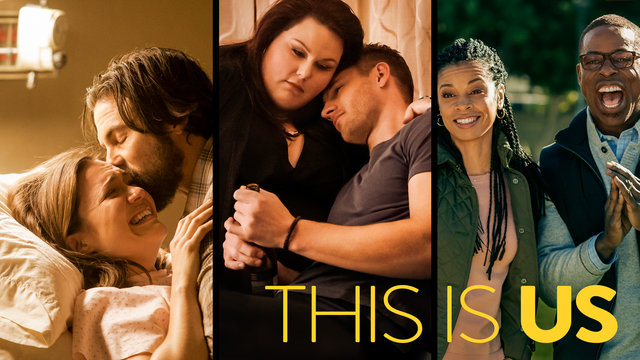This Is Us Is the Parable on White Privilege America Needs
This Is (Literally) U.S.


While the show’s ability to turn all of our emotions into slush has been well documented across social media, I’ve seen little chatter about the way the show is gently exposing America’s racial failings. It’s a show that appears to be innocently following the ups and downs of a family with “triplets”—a set of white twins and an adopted black boy born on the same day—but the show is low-key looking at race in America from a different angle every week.
Sterling K. Brown plays Randall, the Black triplet. He has a job that no one in his family seems to understand, but it pays extremely well. He lives in a wealthy, all-white neighborhood and it appears that much of his day, outside of the home, is spent in the company of white people. The show spends a lot of time on Randall’s identity issues, both in the present time and in flashbacks. He reconnects with his biological father, William (Ron Cephas Jones), who is a musician and a poet, whereas Randall leads a life void of artistic endeavors, revealing that there is a certain richness missing from his life. This is symbolic of what is lost when Black folks are cut off from their roots. We’re often expected to erase all aspects of our culture from our persona to succeed in white America.
Randall and William are both explorations into what non-toxic masculinity can look like. While the cast of This Is Us is mostly white, there are two Black men featured on the show and neither has been pigeon-holed into hyper-masculine Black male stereotypes—William’s signature wardrobe piece is his cardigan! Both characters are allowed a full range of emotions. We see them discussing their feelings with each other, with their partners, and with other members of the family. Randall and William are both shown nurturing Randall’s daughters in every episode, demonstrating active parenting. Randall respects his wife and values her opinion. William brings his former partner home with him on Christmas and it barely creates a ripple within the family when it’s revealed that Grandpa is queer. This variety in the portrayals of people of color in shows and movies broadens the understanding that people of color are not a monolithic group.
Let’s be honest, though: Kevin and Kate’s plot lines are ridiculously boring and Randall’s story is the one viewers are tuning in for week after week. Justin Hartley plays Kevin, whose struggle centers on the fact that his life has been too blessed. He’s an attractive white man, he’s been on a successful TV show, and he has a family that loves him. This sends him into a lightweight existential crisis. Much like Pinocchio’s quest to be a “real boy,” Kevin just wants people to take him seriously. Kate (Chrissy Metz) swings back and forth between obsessing over her weight and dealing with boyfriend problems.
In comparison, Randall is dealing with some real shit. He’s just been reconnected with his biological father who only has a few months to live and also finds out his mother has known where his father was all along. Watching the internal/external dilemma divide unfold in the triplets’ lives every week is reminiscent of what it’s like to be Black in America. When you have to worry about racism at every turn in your daily life, you don’t have the luxury of solely focusing on your personal problems.
The show has also touched on race in very direct ways. In episodes “The Pool” and “The Trip,” young Randall’s parents are forced to accept the reality that they can’t simply love their Black son and cling to their good intentions and expect him feel like he belongs in their all-White life. In “The Pool,” Randall is drawn to the Black families that sit off in their own area. His mother Rebecca, played by Mandy Moore, must humble herself by the end of the episode and accept assistance and friendship from one of the Black mothers.
In “The Trip,” his father, Jack, played by Milo Ventimiglia, is the one who must put his feelings aside when they enroll Randall in a Black karate dojo. Although Rebecca ultimately decides to keep Randall and his father apart, viewers are not left to sympathize with her “well-meaning” decision, as there is a fall out between her and Randall. The show makes it very apparent what she has taken from him by keeping him from his father. The writers have chosen to hold whiteness accountable in a way that we don’t often see in mainstream media (or in courtrooms for that matter).
So, while many critics have written the show off as fluff and many viewers think they’re just watching a family drama, the show is serving up so much more.
Minda Honey is writing a memoir, “An Anthology of Assholes,” about her time spent out West squandering her youth on the wrong men. Follow her on Twitter: @MindaHoney.
Want more stories like this? Become a subscriber and support the site!
—The Mary Sue has a strict comment policy that forbids, but is not limited to, personal insults toward anyone, hate speech, and trolling.—
Follow The Mary Sue on Twitter, Facebook, Tumblr, Pinterest, & Google+.
Have a tip we should know? [email protected]